Folie 1 - AHK Vietnam
advertisement
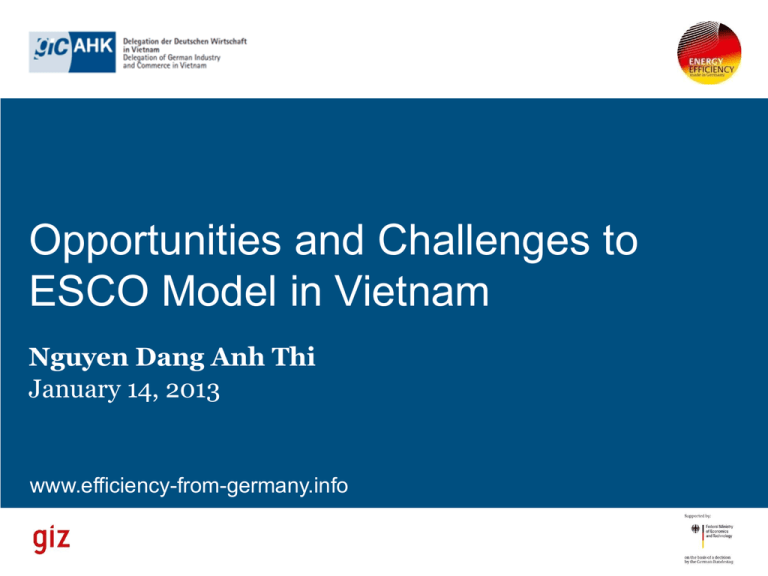
Opportunities and Challenges to ESCO Model in Vietnam Nguyen Dang Anh Thi January 14, 2013 www.efficiency-from-germany.info Table of Contents ESCO Business Model 3 Status of ESCO in Vietnam 6 Legal Framework 7 Market Opportunity for ESCO Development 8 Major Challenges to ESCO Development 12 Case Study 14 Recommendations for ESCO Development 16 Appendix: Key ESCO Players 17 Energy Service Company (ESCO) Business Model ESCO is an organization that offers a broad range of energy-saving solutions, including energy audits, design and implementation of energy conservation measures, operation and management of introduced facilities, and procurement of project funds. Guaranteed What is an ESCO? Energy Consumption or utility cost The basic concept of ESCO is that the client does not have to incur any upfront capital investment and is only responsible for the payment for the investment made or arranged by the ESCO. Two key remuneration models of ESCO contracts: shared savings and guaranteed savings Client’s E financial gain ESCO’s fee Re pa y m en t Interest Capital investme nt Energy Consumption or utility cost Before ESCO project Client’s financial gain During ESCO project Energy Consumption or utility cost After ESCO project Energy Service Company (ESCO) Business Model Shared Savings Financial Model Source: IFC energy service company market analysis (2011) Energy Service Company (ESCO) Business Model Guaranteed Savings Financial Model Source: IFC energy service company market analysis (2011) Status of ESCO in Vietnam Overview The ESCO market in Vietnam is still in its infancy and unlikely to develop without sustained government support. There are about 15 “so-called” ESCOs operating in Vietnam. These are generally small in size and weak in asset base. Data on level of ESCO activities is limited Majority of ESCOs in Vietnam remain incapable in terms of finance and technology, therefore they only offer simple services and haven't fully met market demand Most of ESCOs can not access to financing due to limited financing capacity and weak balance sheet. National EE Law National EE programs Grants for ESCO Energy Audit assistance Tax incentives Yes Yes No No No Legal Framework The Law No. 50/2010/QH12 on Energy Efficiency and Conservation took effect in 2011; Decree No. 21/2011/NĐ-CP of the Government provides guidance on the implementation of the Law on Energy Efficiency and Conservation; Decision No. 1427/QĐ-TTg dated 2nd Oct. 2012 approving the National Target program for Energy Efficiency and Conservation in period 2012-2015; Decision No. 1393/QĐ-TTg dated 25th Sep. 2012 approving the National Green Growth Strategy; The Law No. 59/2005/QH11 on Investment; and its guidance documents; The Law No. 60/2005/QH11 on Enterprises; and its guidance documents; The Law No. 14/2008/QH12 on Corporate Income Tax; The Law No. 45/2005/QH11 on Import Tax and Export Tax. Market Opportunity for ESCO Development in Vietnam Huge market potential Power consumption is forecast to increase from 81TWh in 2010 to 451TWh in 2030 while supply is shortage. More than 1,200 key energy-consumption facilities using over 1,000 TOE per year The total investment needed for EE projects during 2011-2015 is US$ 847m Total investment potential (US$ million) Annual saving potential (US$ million) $479 $368 Fuel shortage after 2015 Vietnam has started to import steam coal and oil products over the last 5 years Although oil is currently its largest source of export revenue, Vietnam is projected to become a net importer by 2015 $94 Industrial Source: Reexcapitalasia, October 2010 $96 Commercial Market Opportunity for ESCO Development in Vietnam (Cont.) Current efforts of the Government and international organizations to create electricity market based on competitiveness Removal of fuel subsidies Power sector reform based on competitive market Interest of stakeholders in energy efficiency market Campaign on EE launched in Nov 2012 under which Vietnamese firms having EE projects will have an opportunity to borrow capital from various financial institutions such as: IFC at $100 million Danish embassy at $30 million Asian Development Bank at $100 million World Bank at $70-$100 million, and Japan International Cooperation Agency at $50 million Energy Efficiency in Industrial Sector 8 $103 100 Total investment potential (US$ million) Annual saving potential (US$ million) 5.6 80 6 4.7 4.2 60 3.4 $42 40 3.9 4 $38 $30 $29 20 $9 $9 $28 $8 2 $5 0 0 Food products and beverages Non-mentallic mineral products Source: Reexcapitalasia, October 2010 Fabricated mental Chemicals and products chemical products Textiles Years US$ million Payback (in years) Energy Efficiency in Commercial Sector Investment potential Annual Saving Potential Payback 10.7 436 12 10 400 8 6.6 300 6 4.6 200 4 100 92 8 0 Hotels Source: Reexcapitalasia, October 2010 2 34 1 Commercial offices 3 Retail outlets 0 Years US$ Million 500 Major Challenges for ESCO Development in Vietnam Difficulty accessing financing Scarce capital and immature banking sector ESCOs are not aware of how to access financing Unawareness of existing grants, loans, credit facilities offered by a large number of international financial support mechanism. Unclear system for accessing domestic source of capital ESCOs and their clients are unknown or not considered creditworthy Lenders is lack of familiarity with EE financing Lenders is lack of confidence in return of EE projects High administrative and transaction costs related to technical challenges, time-consuming contract negotiation, lack of a legal and institutional framework and complicated government procurement rules Major Challenges for ESCO Development in Vietnam Governmental supports in terms of policies and measures are not sufficient: No tax incentives Lack of an effective overarching and comprehensive EE policy framework Insufficient financial support and assistance Electricity price subsidies negatively effect energy investment EE is not yet regarded as top business priority by many companies Users are not fully aware of EE and not confident that equipments deployed can achieve projected savings Challenges of the EPC business model: Low profit margin due to electricity price subsidy The uncertainties associated with remuneration based on guaranteeing savings Risks associated with clients who do not fulfill their end of the contract The costs associated with preparing complicated bids that may not be successful Case Study 1: Thailand’s Energy Efficiency Revolving Fund (EERF) EERF Founded in 2003 Total budgeted size: US$235mil Credit lines of US$ 2.5-10 mil/bank Repayment within 10 years Interest (0.5%/year) 13 banks Repayment + Interest (max. 4%/year) max amount ~ US$1.6m/project Loan term: max. 7 years EE/RE Developers Resulted Projects financed: 294 Total investment: UD$519 mil Financial saving: US$177 mil/year Energy savings: 320 ktoe/year CO2 reduction: 1 mil ton annually Source: Center for Clean Air Policy, 2012 Case Study 2: Thailand’s ESCO Fund ESCO Fund Phase 1: 2008-2010 (US$32.6 mil) Phase 2: 2011-2012 Non-profit foundation EE/RE Developers Equity investment: (10-50% of project, max US$1.6 mil, 5-7 years investment) ESCO venture capital: (max US$1.6 mil, 5-7 years investment) Equity leasing: (up to 100% of project cost, max US$0.3 mil, payback <5years, interest rate 4%) Technical Assistance: (up to US$3250/project) Credit guarantee facility: (up to US$0.3 mil/project, < 5 years, 1.75% guarantor fee) Carbon credit trading Resulted Projects financed: 39 Total investment: UD$166 mil Financial saving: US$30 mil/year Energy savings: 23.97 ktoe/year Source: Center for Clean Air Policy, 2012 Recommendations for ESCO Development Having a focal agency to coordinate all EE programs funded by local and international organizations. Developing financial support mechanisms: Dedicated debt agencies, development funds or grants, loan guarantees… Thailand’s EE Revolving Fund and ESCO Fund could be suitable models to learn. Building legal framework for ESCO business Capacity building: ESCOs, bankers, end-users, governmental agencies. KEY ESCO PLAYERS APPENDIX Key ESCO Players Company name Description ECC-Ha Noi Established in 2007 Supported by national budget Mainly operating in Hanoi and surrounding areas The primary function: research and consultancy assistance to organizational energy users ECC-Ho Chi Minh Established in 2002 as a member of the Department of Science and Technology Supported by national budget Mainly operating in Ho Chi Minh City and surrounding areas The primary function: energy auditing, technology transfer, energy conservation training, energy conservation communication, and financial consultancy ENERTEAM Established in 1995, Enerteam is a non-governmental organization and the first science & technology organization specializing in energy efficiency in Vietnam Main services: energy auditing, technical & financial analysis and performance guaranty for energy saving Completed projects: Masan, Big C Key ESCO Players Company name Description Schneider Electric Vietnam Moving from product sale to solution sale since 2008 Strong in providing Building Energy Management Systems and solutions Provided energy management system for Intel Manufactures, Bitexco Tower, Hilton Hotel, Agribank Data Center, Vietinbank HaNoi, BaoViet Bank Hanoi SYSTECH ESCO Founded in 2006 Main services: providing equipment and energy saving solutions Involved in several EE projects sponsored by foreign organizations (Meet Bis, Danida, UNDP, GEF, Jica, USEP, WB, SIDA,..) HATECH ESCO Founded in 2008, Hatech is a company under the support UNDP and the Vietnam National Energy Efficiency Program (VNEEP) Main services: providing comprehensive packages of energy saving solutions with financial support to enterprises. Involved projects: Colusa Miliket Foodstuff JSC, Truong Giang Seafood processing Corp, Thien Tri Paper Manufacture, Thanh Vinh Corp, Thuan An 3,… Key ESCO Players Company name Description RCEE-NIRAS VESCO Founded in 2008 as a “backyard” of RCEE-NIRAS Main Services: specializing in energy audit Involved in over 10 projects VETS Mainly operating in the North Vietnam Main Services: Consultancy and implementation of EE systems Target sectors: garment, cement Hoa Thuan Corp Founded in 2009; mainly operating in the South Vietnam Main Services: providing EE solutions for compressor machine manufacturers Target sectors: plastic industry Founded in 2006, RCEE-NIRAS is a Danish-Vietnamese consulting company, mainly operating in the North Vietnam Main Services: providing consultancy services in Energy, Climate and Environment field Participating in several foreign Energy and Environment projects together with the Ministry of Industry and Trade Key ESCO Players Company name Description Solar BK Viet ESCO Kasati ESCO Founded in 2006; mainly operating in the South Vietnam Main Services: providing packages of EE solutions focusing in solar and wind energy Completed projects: Majestic Hotel, Morin Hotel, Norfolk Hotel, Sai Gon Hotel, Wooshu complex, Son Long Thuan Resort, Vinamilk, Tan Cang Restaurant,… Established in February 2012 by ECC HCMC and Veglia-the first ESCO in Japan Main services: providing packaged EE solutions and financial arrangement Succeeded with financial assistance from the International Finance Corporation (IFC). Ongoing projects : Legend Saigon Established in August 2012 by Vietnam Posts and Telecommunication Group and other individuals Strategic partner: Enerteam Main services: providing packaged EE solutions and financial arrangement Completed projects: No information Further info: ndanhthi@yahoo.com
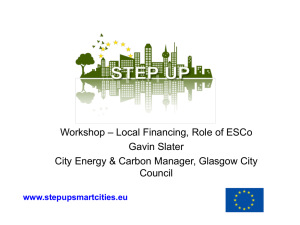

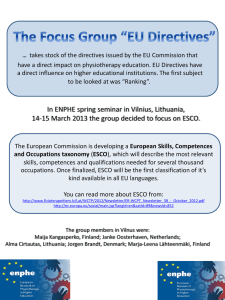
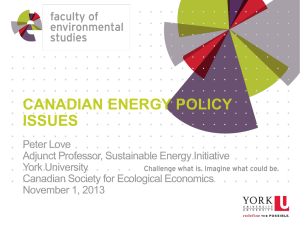
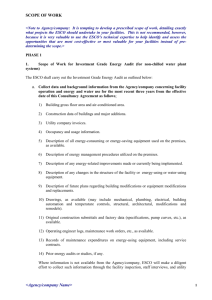
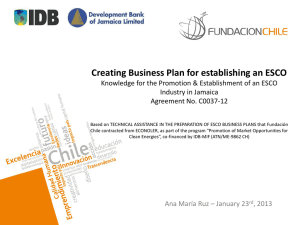
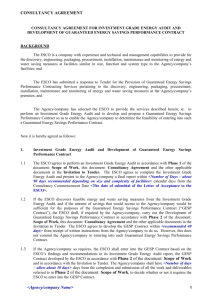
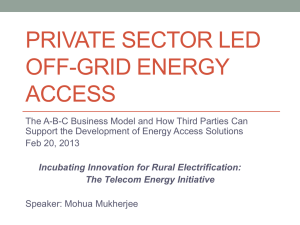
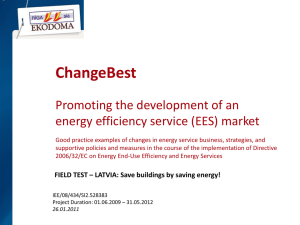
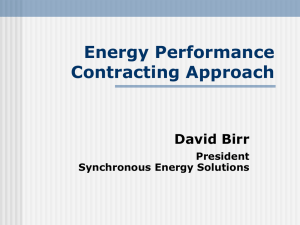

![vietnam[1].](http://s2.studylib.net/store/data/005329784_1-42b2e9fc4f7c73463c31fd4de82c4fa3-300x300.png)